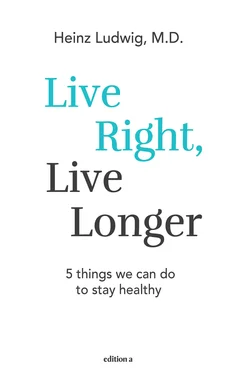A few weeks later, he brought the subject up again. »The situation is extremely burdensome to me, but I have resigned myself to it«, he said. »I just want to see things realistically, I’ve done that my entire life.« He said that despite all the pain medication, he was always in pain.
Also, he was suffering from the side effects of the pain therapy, had a dry mouth, his digestion functioned only with the help of strong laxatives, in addition to which he had the impression that the morphine treatment was interfering with his ability to think. »I’m not the person I was. I’m alone. There is nothing that I could be looking forward to, either a visit from someone tomorrow or something in the more distant future, because, the way things are developing, I don’t have a more distant future. Looked at objectively, continuing to live no longer makes sense to me, quite the contrary. It has become a terrible burden for me.«
It would have been nonsense to speak encouragingly to him again. My one hope was that, despite all of his pain, he might experience at least a few hours that were of value to him. I told him that. But it was not sufficiently convincing to change his point of view. Nonetheless, I could not have fulfilled Robert Tucker’s wish for a premature end, even had I wanted to. It’s against the law in Austria.
As far as that point is concerned, we are living in a paradoxical world. We kill the unborn, who cannot participate in that decision, and in some countries we force adult persons to continue to suffer who have no chance of improvement, are devoid of every other perspective, and who wish to make a rational decision to exit with dignity while they are still competent. The issue here is that there is in fact such a thing as suffering that cannot be alleviated and situations in life in which there is no future, which leave patients with a deep sense of futility and in despair.
There are different approaches to this throughout the world. They range from prohibition of euthanasia, to »passive euthanasia,« which means allowing the ill patient to die if he or she has requested it, to »active euthanasia,« in which the physician on request of the patient administers the life-ending drug – which is what Mr. Tucker asked for and which is legal in a few countries such as the Netherlands and Belgium –, to physician-assisted suicide, in which the patient must himself take the lethal dose provided by a physician – the case in Oregon and other U.S. states –, to assisted suicide in which the assistance does not have to come from a physician (as in Switzerland). For all of these variations there are careful measures in place to prevent any possible abuse.
All we could do for Robert Tucker was what is called palliative sedation. That made it possible for him not to have to suffer pain in his final days.
In the meanwhile, he put his estate in order. To this end, a notary spoke with him at bedside. Given what I had come to know about him, I suspect that he left his remaining financial resources to a charitable organization. He made his body over to the Medical University to be used for teaching purposes. He had earlier been informed that his remains would be buried in a specially designated grave provided by the City of Vienna. I admired him for the sobriety with which he proceeded in this issue. I told him that in our last conversation.
We also talked about death. I told him of the many similar reports from persons who had had near-death experiences. These are persons who, for example, have been reanimated after a circulatory collapse. While these persons are being reanimated, they experience the separation of their consciousness from their body, which floats, for example, above the cardiac emergency team that is working on their heart. They remember many details of the efforts of the emergency service to save them, and they describe as with one voice a never before experienced feeling of euphoria. It is true that no one can prove that this is also the case at the time of actual death. But these persons have the impression of being pulled forward through a tunnel by a glorious stream of light into a world of sanctuary and bliss. »Should this be the reality,« I said, »then we shouldn’t waste another day on this earth, but instead follow the blazing light into happiness.«
»That certainly sounds fantastic. Only, I lack the necessary faith,« he answered. »It’s okay for me to go. But it would in fact have been helpful if there had been a few people I could now say goodbye to. But then perhaps all of this would have developed differently anyway.«
When people ask me as an oncologist, cancer researcher and hematologist, what they can do not to get sick in the first place, I sometimes think of Martha Allen and Robert Tucker. I cannot say whether Martha Allen would have lived so long if her love and concern for her daughter had not compelled her to set those goals for herself. I also cannot say for sure whether Robert Tucker’s bout with cancer would have ended differently had there been friends and family in his life who had stood by him, supported him and cared for his needs, and, when the end did come, to whom he could have said goodbye. Nevertheless, these two outcomes stand for one of the five things that I always enumerate for those who want to take the maintenance of their health into their own hands and contribute to it to the extent possible. Mrs. Allen and Mr. Tucker are examples of the importance of being integrated into a social network, of the value of close human relationships, of the profound effects of loving as well as of being seen and loved for who we are. Our experiences in this connection can have not only healing effects on our mind and spirit but also enormous influence on our body.
Usually patients consult me when they are already ill and not at a point in time when they are still in good health and should be dealing with the question of how to stay that way. It is human nature not to concern ourselves much with our health as long as we have it. We push thoughts of illness aside and do not consult a doctor until we absolutely need to. This often has negative consequences, inasmuch as many illnesses could be prevented that are difficult to reverse once the characteristic symptoms of the disease have appeared.
Because the possibilities of preventive medicine have become a subject of discussion in schools and the media, and because of the efforts of the national health agencies and physicians’ organizations, more and more people are asking themselves what they can do to stay healthy. The awareness of one’s responsibility for one’s own health is growing steadily. This is certainly a welcome development, but it has a problematic aspect, and that aspect is the role of the media.
The amount of information that is in part contradictory and not scientifically founded is also growing, made available to us especially through the internet, and accepted by large parts of the population. This will probably also be the case in the foreseeable future. When the subject is popular and likely to stimulate the human desire for magic or for extraordinary healing power, certain members of the media can make incorrect information public, sometimes because of sloppiness, but more often with a scandal-mongering intent, to maintain circulation, or the number of times accessed, or to attract listeners or viewers.
Thus, society should demand a greater sense of responsibility and the pledge of careful background research. Particularly in medicine, unrealistic claims can create an enormous amount of uncertainty, unrealistic hopes and expectations, which raises the question of whether severe transgressions should be liable to appropriate consequences.
People turn to me as an oncologist in order to discuss, among other things, preventive measures and/or how and which cancers to screen for. During these conversations, it becomes clear that people are unsettled by the anxiety-producing and often contradictory information about cancer, which maintains that there is a generally increasing threat of developing it. This, so stated, is not correct. The risk of developing cancer and dying from it has declined steadily over the past 25 years, 1but the overall number of cancer cases is rising. This is due to increasing life expectancy, since cancer is for the most part an illness of older persons, and the population, not only in Western countries, is getting older.
Читать дальше












